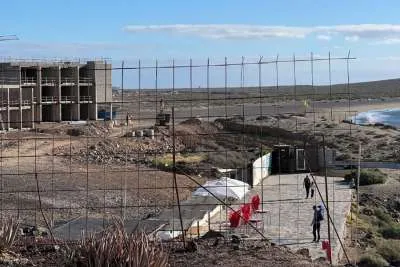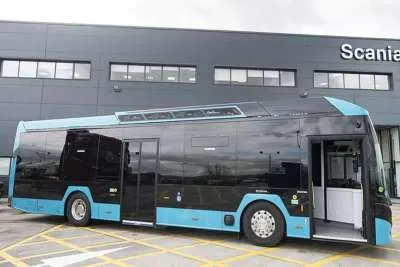Portugal’s ‘Digital Nomad’ Boom: How remote work is transforming the Atlantic coast
- 18-04-2025
- Business
- David Brown
- Photo Credit: Freepik
Portugal’s Atlantic coast has become a magnet for digital nomads, transforming the landscape of remote work. We've witnessed a surge in this trend, with Lisbon, in particular, becoming a vibrant hub. Digital nomads are reshaping the local economy and culture, bringing with them a wave of new opportunities and challenges.
Our journey takes us to the heart of this transformation, where excellent infrastructure blends seamlessly with a rich cultural backdrop. The allure of Portugal is undeniable; its mix of scenic beauty and modern conveniences has positioned it as a top destination for remote workers worldwide. As our exploration unfolds, we aim to reveal what attracts so many and how this movement is changing the face of the Atlantic coast.
The story of Portugal’s digital nomad boom isn’t just about workspaces and wifi; it's about the people and the communities being built. With more nomads than ever settling here, we find an evolving landscape buzzing with innovation and activity. The excitement is palpable as we delve into how this trend continues to shape the Portuguese coast, echoing a broader shift toward a more connected and flexible working world.
DIGITAL NOMADISM IN PORTUGAL: AN OVERVIEW
Portugal has become a hub for digital nomads drawn by its vibrant cities, coastline, and role as a gateway to Europe. We take a closer look at the factors contributing to this boom and the country's supportive policies for remote workers.
However, navigating the local tax system can be complex, especially for freelancers and remote workers unfamiliar with Portuguese regulations. That's where portugal tax consultants come in, they provide crucial guidance on residency status, income declarations, and optimising tax benefits such as the Non-Habitual Resident (NHR) regime, helping digital nomads stay compliant while maximising their earnings.
Factors Driving Remote Work in Portugal
Portugal's location and unique cultural blend make it appealing to digital nomads. Lisbon and Porto offer rich experiences with their mix of history and modern amenities. The Algarve and Madeira regions provide stunning natural beauty and a relaxed pace, perfect for remote work.
Affordable living, compared to other Western European countries, enhances its attractiveness. Society is generally welcoming, with many locals speaking English. Tech infrastructure is reliable, ensuring good internet connectivity is crucial for remote work. Access to public places, like cafes and coworking spaces, also gives us flexible work environments.
Portugal's Digital Nomad Visas and Policies
Portugal has adapted well to the digital lifestyle, introducing visas aimed at nomads, such as the Digital Nomad Visa. This initiative encourages more to settle in our country by easing legal processes. Policies support both short-term travellers and those looking for a longer stay.
Acquiring local SIM cards is simple, aiding communication and connectivity. There’s public transport in major cities, making travel easy and cost-effective. While some still express concerns over the influx of nomads, pushing up local prices, Portugal remains committed to finding a balance between local needs and welcoming global citizens.
CULTURAL AND HISTORICAL IMPACTS ON MODERN SOCIETY
Today's digital nomads are more than just remote workers; they are part of a growing community reshaping Portugal's cultural landscape. We explore how Portuguese culture and historical connections with Brazil influence this transformation.
Influence of Portuguese Culture on the Expat Community
Portuguese culture has a strong influence on our community of digital nomads and expats. The easy-going lifestyle, delicious food, and welcoming locals make us feel at home in towns along the Atlantic Coast. Traditional events like the Festa de São João and Fado music performances draw us into local life, offering glimpses into Portugal's rich heritage.
Language also plays a role. While many of us communicate in English, learning Portuguese connects us with locals and increases our cultural appreciation. Engaging in these traditions builds bridges; we enrich our experience as they share their rich customs and history.
Historical Ties Between Portugal and Brazil
The deep historical ties between Portugal and Brazil are pivotal to understanding modern society. Colonial history and shared linguistic roots unite us with both nations, bridging cultural gaps. Influences from Brazil, like music and colourful festivals, often make their way into our lives, enriching our shared spaces in Portugal.
These ties aren't just historical. Modern migrations between the two countries shape our community, fostering a blend of Portuguese and Brazilian cultures in daily life. By recognizing these historical connections, we appreciate a more complex and intertwined cultural identity that enhances our experience in Portugal, connecting past and present seamlessly.
ECONOMIC AND SOCIAL CONTRIBUTIONS OF DIGITAL NOMADS
Digital nomads are reshaping economies and societies, boosting entrepreneurship and innovation, and impacting local economies through remote work. We explore how these changes play out in Portugal, focusing on both economic and social dimensions.
Entrepreneurship and Innovation Among Expats
Digital nomads bring a boost to entrepreneurial culture. They set up diverse ventures, tapping into global markets while rooted in local soil. This newfound dynamism fosters innovation as they share ideas and skills with local entrepreneurs.
Table of Influence:
|
Local Impact |
Digital Nomads' Contribution |
|
Startup Ecosystem |
Ideas from diverse industries |
|
Tech Adoption |
Advanced digital tools and platforms |
|
Knowledge Sharing |
Workshops and networking events |
Our influence breeds creativity and provides fresh perspectives that can challenge traditional business norms. This environment helps local startups by encouraging new ways of thinking about problems and solutions. By working closely with local talent, we help transform small communities into tech-savvy hubs with global reach.
The Role of Remote Work in the Local Economy
Remote work is a game-changer for Portugal's local economy. By attracting digital nomads, we enhance economic diversity and inject valuable income.
Nomads contribute through expenditure on housing, dining, and leisure.
List of Economic Contributions:
- Increased demand for local products and services
- Job creation in real estate and food services
- Encouragement for co-working spaces
This influx promotes a division of labour where specialised services can flourish. Our presence may create shifts in dominance within sectors, leading to potential disparities but also opening doors for new opportunities. While growth can bring inequality, the economic boost often outweighs negatives, fostering a more dynamic economic landscape.
LIVING CONDITIONS AND STABILITY FOR DIGITAL NOMADS
As digital nomads flock to Portugal, we explore the essentials that affect their daily lives and sense of stability. From cost-effective housing to being part of a supportive community, Portugal offers a mix of practical and enriching experiences.
Housing and Cost of Living in Portugal
In Portugal, housing options for digital nomads range from affordable apartments in Lisbon to stunning beachside villas in the Algarve. Rent is generally cheaper compared to other European countries, making it an enticing choice for remote workers.
While Lisbon and Porto might have slightly higher costs, smaller towns offer more bang for our buck. Many choose co-living spaces for both their affordability and the chance to connect with like-minded individuals.
Cost breakdown for a single bed in a shared apartment:
|
City |
Monthly Cost (€) |
|
Lisbon |
500 - 800 |
|
Porto |
400 - 700 |
|
Algarve |
350 - 600 |
Living expenses such as food and transportation are also reasonable, contributing to a balanced lifestyle.
Safety and Security in Portuguese Coastal Areas
The safety of our environment is a priority for digital nomads. Portugal ranks high in global safety indices, with low crime rates and a welcoming atmosphere. This is a significant factor for those considering a longer stay, especially along the scenic coastal areas.
In popular regions like the Algarve, local policing ensures security, keeping both residents and tourists at ease. Strolling through picturesque streets is a pleasant experience, and we can feel confident in our safety.
The community's trust and friendliness add to this, creating a soothing sense of security.
Integration and Community Engagement
Becoming part of the local society is vital for digital nomads in Portugal. We find extensive opportunities for integration and community engagement, making our stay more fulfilling.
Meetups and community events are common, especially in cities like Lisbon and Porto. These gatherings offer chances to mingle and form networks.
Language can be a barrier, though many Portuguese people speak English, which eases our integration process. Engaging with these communities enriches our experience, providing deeper social and cultural connections.
Building relationships with local residents is key to feeling at home and truly living the Portuguese experience.
CHALLENGES AND CONSIDERATIONS FOR FUTURE GROWTH
As digital nomads flock to Portugal, we must address several challenges. Infrastructure strains and legal complexities arise, while cultural differences may emerge. Sustainability and long-term growth are also key factors we need to consider.
Overcoming Infrastructure and Legal Hurdles
Our focus on infrastructure includes reliable internet, housing, and workspace availability. Growing demand stresses existing resources. We need to upgrade broadband networks for seamless connectivity.
Legal considerations are gaining attention. Residency policies are tightening. New rules limit visa availability, reducing the ease of relocation. Balancing immigration laws with growth is essential for smoother transitions. We must also consider copyright issues with increased digital output.
As these challenges arise, solutions will pave the way for sustainable development. Collaboration between the government and the private sector is crucial to achieving this progress.
Potential for Cultural Clashes and Assimilation
Digital nomads bring diverse backgrounds. As they settle, cultural clashes may occur in local communities. Our approach should be to foster mutual respect and understanding across cultures.
Assimilation is not without challenges. Language barriers and social practices create distance between locals and nomads. Bridging these gaps requires initiatives promoting interaction and learning.
By encouraging cultural exchange, we can minimise tensions. Holding local events and language classes can support integration. Together, we can create harmonious communities that embrace diversity without sacrificing local traditions.
Sustainability and Long-Term Prospects
The influx of digital nomads questions sustainability in Portugal. Increased living costs impact locals. Balancing tourism, living standards, and environmental care is paramount to long-term success.
Maintaining affordability is challenging as demand rises. We should consider economic policies supporting both nomads and residents. Developing strategies for eco-friendly tourism can help preserve coastal beauty.
Long-term prospects look promising, with careful management. By ensuring sustainability, we enhance Portugal's appeal as a digital nomad hub. Addressing these factors is crucial for investment in the future.
Through strategic planning, we can navigate these challenges and seize opportunities for growth.



























































